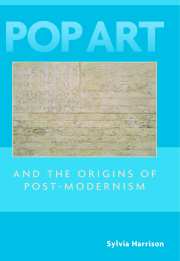1 - Post-Modernist Assumptions
from PART ONE - THEORETICAL FRAMEWORK
Published online by Cambridge University Press: 23 July 2009
Summary
The aim of this section is not to attempt to answer the difficult and fraught question “What is post-modernism?” It is rather to establish a range of post-modernist assumptions that will be used throughout this study to identify what can now be regarded as aspects of post-modernist thought in critical responses to American pop art during the sixties. Both these assumptions and their relevance to the critics under review will be discussed in a schematic manner so as not to pre-empt discussion in subsequent sections of this study.
“Post-modernist” responses to pop were prompted by those features that resisted accommodation within existing formalist or realist critical canons. The most prominent of these is anonymity, that is lack of “authorial presence” or a “centred sense of personal identity.” This is evident in its depersonalized technique, minimal, if any, transformation of source material, and obscure or uninterpretable “message.” A further feature concerns the collapsing of distinctions between élite and mass cultural realms, evident in pop art's indebtedness to the codes, subjects, and, in some instances, technical processes of mass communications. Finally, there is that of the representation of “culture” as opposed to “nature,” the province of realism, insofar as it concerns the simulation of pre-existing signs. Critics theorized these features along either sociological or philosophical lines. They viewed them as reflective of Western urban society in its post-war capitalist-consumerist phase or, alternatively, as eliminative of a world-view in the sense of an authoritative, totalizing system of thought.
- Type
- Chapter
- Information
- Pop Art and the Origins of Post-Modernism , pp. 11 - 34Publisher: Cambridge University PressPrint publication year: 2001

